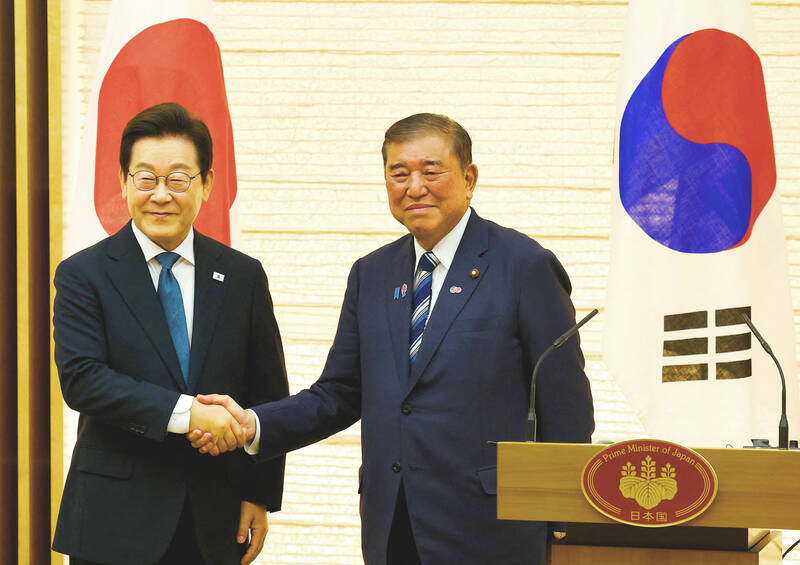South Korean President Lee Jae-myung, in his first full summit with Japanese Prime Minister Shigeru Ishiba in Tokyo, yesterday stressed the importance of setting aside differences and cooperating in common areas, as the leaders showcased their efforts to develop friendly ties.
The neighbors face common challenges from the US, their mutual ally, and Lee’s visit to Japan might help him prepare for his crucial first summit in Washington tomorrow with US President Donald Trump, mainly on trade and defense issues.
Japan and South Korea could cooperate in many areas, but also have conflicts, because they are so geographically close, Lee said.

Photo: AFP
At a time when global trade and security are shaken, it is more important than ever for the two countries with shared principles to cooperate, he added, calling for increased dialogue through “shuttle diplomacy.”
His Tokyo visit before Washington is well received by Japanese officials, who see it as a sign that Lee is placing great importance to relations between the two neighbors whose ties have repeatedly been disrupted by historical disputes.
Ishiba on X wrote that Lee’s trip to Tokyo was the first destination of his foreign trip since taking office in June.
He welcomed Lee’s arrival at the Japanese Prime Minister’s Office and posted photos on social media.
The two leaders first met in a closed, small group of officials before summit talks with expanded groups.
The Asia Group Japan branch associate Rintaro Nishimura said the timing of Lee’s visit showed “his way of pragmatic diplomacy,” with a focus on bilateral and trilateral relations with the US.
For the two leaders, yesterday’s talks were largely symbolic and aimed at highlighting their friendship and focusing on exchanges, as this year also marks the 60th anniversary of normalizing their diplomatic ties, he said.
Possible outcomes of the meeting include fast-track entry visas for South Korean travelers and working holiday programs.
The two leaders are also expected to discuss mutual concerns, including North Korea’s nuclear and missile development, and China’s growing assertiveness in the region.

A magnitude 5.6 earthquake struck off the coast of Yilan County at 12:37pm today, with clear shaking felt across much of northern Taiwan. There were no immediate reports of damage. The epicenter of the quake was 16.9km east-southeast of Yilan County Hall offshore at a depth of 66.8km, Central Weather Administration (CWA) data showed. The maximum intensity registered at a 4 in Yilan County’s Nanao Township (南澳) on Taiwan’s seven-tier scale. Other parts of Yilan, as well as certain areas of Hualien County, Taipei, New Taipei City, Taoyuan, Hsinchu County, Taichung and Miaoli County, recorded intensities of 3. Residents of Yilan County and Taipei received

Taiwan has secured another breakthrough in fruit exports, with jujubes, dragon fruit and lychees approved for shipment to the EU, the Ministry of Agriculture said yesterday. The Animal and Plant Health Inspection Agency on Thursday received formal notification of the approval from the EU, the ministry said, adding that the decision was expected to expand Taiwanese fruit producers’ access to high-end European markets. Taiwan exported 126 tonnes of lychees last year, valued at US$1.48 million, with Japan accounting for 102 tonnes. Other export destinations included New Zealand, Hong Kong, the US and Australia, ministry data showed. Jujube exports totaled 103 tonnes, valued at

BIG SPENDERS: Foreign investors bought the most Taiwan equities since 2005, signaling confidence that an AI boom would continue to benefit chipmakers Taiwan Semiconductor Manufacturing Co’s (TSMC, 台積電) market capitalization swelled to US$2 trillion for the first time following a 4.25 percent rally in its American depositary receipts (ADR) overnight, putting the world’s biggest contract chipmaker sixth on the list of the world’s biggest companies by market capitalization, just behind Amazon.com Inc. The site CompaniesMarketcap.com ranked TSMC ahead of Saudi Aramco and Meta Platforms Inc. The Taiwanese company’s ADRs on Tuesday surged to US$385.75 on the New York Stock Exchange, as strong demand for artificial intelligence (AI) applications led to chip supply constraints and boost revenue growth to record-breaking levels. Each TSMC ADR represents

TRUST: The KMT said it respected the US’ timing and considerations, and hoped it would continue to honor its commitments to helping Taiwan bolster its defenses and deterrence US President Donald Trump is delaying a multibillion-dollar arms sale to Taiwan to ensure his visit to Beijing is successful, a New York Times report said. The weapons sales package has stalled in the US Department of State, the report said, citing US officials it did not identify. The White House has told agencies not to push forward ahead of Trump’s meeting with Chinese President Xi Jinping (習近平), it said. The two last month held a phone call to discuss trade and geopolitical flashpoints ahead of the summit. Xi raised the Taiwan issue and urged the US to handle arms sales to